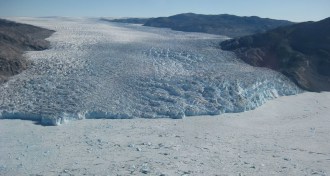Earth
Sign up for our newsletter
We summarize the week's scientific breakthroughs every Thursday.
-
 Climate
ClimateCarbon dioxide in atmosphere reaches landmark level
At 400 parts per million, greenhouse gas concentration is now higher than it has been for millions of years.
By Erin Wayman -
 Earth
EarthJapan’s 2011 earthquake upped Tokyo’s risk
Chance more than doubled that capital city will soon experience big temblor, researchers calculate.
By Erin Wayman -
 Earth
EarthThe Arctic was once warmer, covered by trees
Pliocene epoch featured greenhouse gas levels similar to today's but with higher average temperatures.
By Erin Wayman -
 Climate
ClimateIce loss from Greenland’s glaciers may level off
Simulation suggests long-term effect on sea level not as dire as some predictions.
By Erin Wayman -
 Earth
EarthToxic waste sites may cause health problems for millions
Exposures to lead and chromium represent particular problems, study finds in India, Indonesia and Philippines.
By Erin Wayman -

-
 Earth
EarthSpinning the Core
Laboratory dynamos attempt to generate magnetic fields the way planets and stars do.
-
 Life
LifeSo far, the great tit has coped with climate change
Earlier arrival of birds’ food due to warming temperatures hasn’t yet reduced bird population.
By Susan Milius -
 Earth
EarthEarly Earth’s chlorine blown away by giant impacts
Low levels of chlorine on planet's surface have long puzzled scientists.
By Erin Wayman -
 Earth
EarthRemnants of Earth’s crust survive in the planet’s interior
A slab stayed unperturbed in the mantle for billions of years before resurfacing, sulfur measurements suggest.
By Erin Wayman -
 Earth
EarthYangtze’s age revealed
Geologists narrow window on time of the Chinese river’s origin to 23-36 million years ago.
By Erin Wayman -
 Earth
EarthMagnitude 7.8 earthquake hits Iran
Casualties reported in nearby Pakistan from temblor.
By Erin Wayman